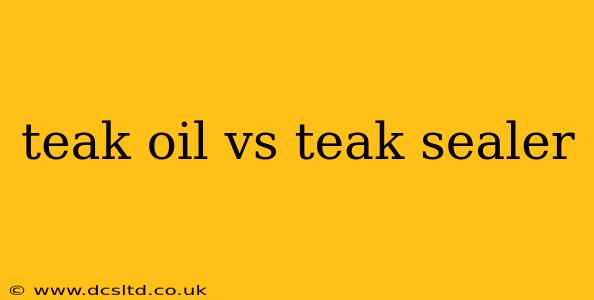Teak wood, renowned for its durability and rich golden hue, requires proper care to maintain its beauty and longevity. Two popular choices for protecting teak are teak oil and teak sealer. While both aim to preserve the wood, they achieve this through different methods and offer distinct advantages and disadvantages. Understanding the key differences between teak oil and teak sealer is crucial for making an informed decision about which product best suits your needs.
What is Teak Oil?
Teak oil, often a blend of linseed oil and other oils, penetrates deep into the wood's pores, nourishing and moisturizing it from within. This process enhances the wood's natural water resistance and helps prevent cracking and splitting. Think of it as a deep conditioner for your teak furniture. It doesn't form a surface film, allowing the wood to breathe and maintain its natural look and feel.
Advantages of Teak Oil:
- Deep penetration: Nourishes the wood from the inside out.
- Enhances natural beauty: Doesn't mask the wood's grain or color.
- Allows wood to breathe: Prevents trapping moisture.
- Relatively easy application: Simple to apply and maintain.
Disadvantages of Teak Oil:
- Requires more frequent application: Needs reapplication every few months, depending on weather conditions and exposure.
- Offers limited UV protection: Doesn't shield the wood from the sun's damaging rays as effectively as sealers.
- Can darken the wood over time: The oil's darkening effect might not be desirable for everyone.
What is Teak Sealer?
Teak sealer, on the other hand, creates a protective barrier on the surface of the wood. This barrier acts as a shield against UV rays, moisture, and other environmental elements. Sealers are typically formulated with resins, varnishes, or other polymers that form a durable film on the teak's surface.
Advantages of Teak Sealer:
- Stronger UV protection: Offers superior protection against sun damage, fading, and discoloration.
- Longer-lasting protection: Requires less frequent reapplication compared to teak oil.
- Better water resistance: Creates a more effective barrier against moisture.
Disadvantages of Teak Sealer:
- Can alter the wood's appearance: May change the wood's color or create a glossy finish.
- Less breathable: Can trap moisture if not applied correctly, potentially leading to rot or mildew.
- More difficult to repair: Repairing damaged areas requires more work than with teak oil.
- Can peel or chip over time: Depending on the quality of the sealer and the environmental conditions.
Teak Oil vs. Teak Sealer: Which is Right for You?
The best choice depends on your priorities and the specific application.
-
Choose teak oil if: You prioritize maintaining the natural look and feel of the teak, you're willing to apply it more frequently, and you're comfortable with less UV protection. Ideal for pieces stored indoors or under cover.
-
Choose teak sealer if: You need stronger UV protection and longer-lasting water resistance, and you're less concerned about the slight alteration to the wood's appearance. Suitable for outdoor furniture exposed to harsh weather conditions.
How Often Should I Apply Teak Oil or Sealer?
This depends largely on the climate, the amount of sun exposure, and the type of product used. Teak oil generally needs reapplication every 3-6 months, while a high-quality teak sealer might last for a year or more. Always follow the manufacturer's instructions for optimal results.
Can I Use Teak Oil and Sealer Together?
While not typically recommended, some individuals apply teak oil as a pre-treatment before applying sealer. This approach can help nourish the wood and improve the sealer's adhesion. However, it's essential to ensure complete drying between applications to prevent trapping moisture. Consult the manufacturer's instructions for both products before attempting this approach.
What are the best brands of teak oil and sealer?
Many reputable brands offer high-quality teak oil and sealers. Research and read reviews to find a product that aligns with your needs and budget. Remember to always choose products specifically designed for teak wood.
By carefully weighing the pros and cons of each product, you can make the best choice to protect your teak investment and maintain its beauty for years to come. Remember that proper preparation of the wood surface before application is crucial for optimal results, regardless of whether you choose oil or sealer.
